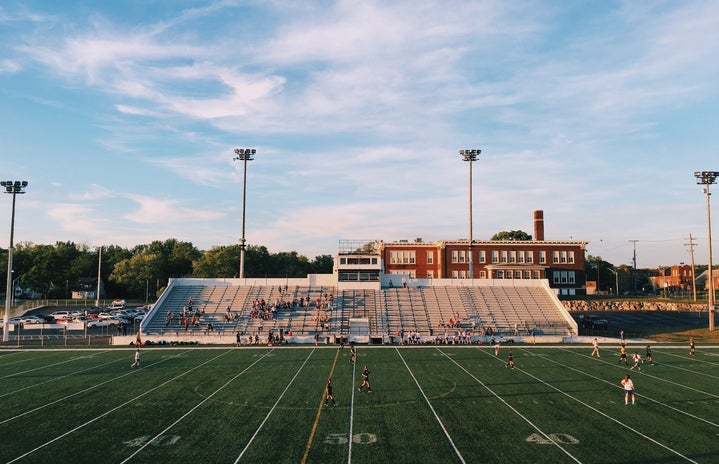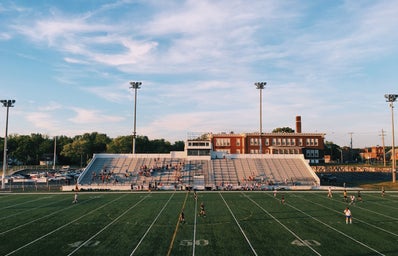Sports have been a part of my life for as long as I can remember; from them, I’ve made friends and good memories that I’ll carry with me forever. While I was lucky enough not to be riddled with too many injuries growing up, I often witnessed my friends getting injured in play. One of the scariest injuries to witness, one that I have witnessed a few times now, are concussions.
(Above: NFL Panther’s linebacker Luke Kuechly after suffering a concussion in play just last week)
A concussion is “a type of traumatic brain injury… caused by a bump, blow or jolt to the head or hit to the body that causes the head and brain to move rapidly back and forth” (CDC). Symptoms include headaches, nausea, dizziness, memory and concentration problems, and blurred vision, among others.
A study conducted at the Montreal General Hospital showed the negative effects concussions can have on decision-making skills and hand-eye coordination. They saw similar effects between drunk driving and driving with a brain injury. Moreover, repeated concussions can lead to Chronic Traumatic Encephalopathy or CTE, a degenerative brain disease associated with personality and behavioural changes including aggression, depression, dementia and memory loss. Worst yet, there is no treatment or cure for CTE, and “a definitive diagnosis… can only be made after death” (alz.org). Another study published in the Canadian Medical Association Journal found that concussions triple the risk of suicide among adults. Dave Duerson, for instance, was a former Chicago Bears player who committed suicide by shooting himself in the chest, requesting in an accompanying note that his brain be used for reasearch; Duerson was later found to have CTE.
Athletes are known to be physically strong, but they are also among the strongest mentally. So when it comes to self-reporting injuries, especially mild concussions, many athletes won’t do it. They are reluctant to sit themselves out, to remove themselves from the line-up they have worked so hard to be a part of. They will ignore the headaches or dizziness and they won’t ask for medical attention. They want to be perceived by their coaches and teammates as strong, not weak.
This is a common attitude towards all injuries; as an athlete you are trained to push through pain. Injuries test your ability to sacrifice short term play time for your well-being in the long term. Athletes aren’t trained to sit on the bench or watch from the sidelines; they’re trained to play.
Last week, when the commissioner of the Canadian Football League (CFL) announced there was no link between football and concussions, it was a loss for anyone and everyone who has suffered or witnessed a teammate suffer a concussion through sports. Granted, the CFL is in a bind; a $200 million class-action lawsuit filed against the league threatens to shut down operations should the ruling be granted in the plaintiff’s favour (National Post). However, this further reinforces the dismissive attitude surrounding concussions, which refuses to acknowledge the severe and long-term effects associated with the injury.
(Above: CFL Winnipeg centre Drew Willy was knocked unconscious by an opposing player last year)
I remember I was sitting on the bench when one of my teammates had gotten injured, and a passerby commented something along the lines of, “It’s a contact sport, that’s what happens. It’s a contact sport.” Aside from the fact that he said this with seemingly no remorse or sympathy for my teammate limping off the field, there are indeed inherent risks associated with all sports. However, when the largest professional leagues and associations are hesitant to acknowledge and provide support systems for concussed players, this sets a dangerous precedent for future generations of athletes. It encourages them to swallow their pain and ignore symptoms at their own expense.
Luckily, there are many initiatives close to home that aim to make up for the lack of concussion-related resources available. Scott Delaney, an associate professor at McGill, is currently piloting a concussion contract at McGill University where athletes, coaches and therapists agree upon a concussion symptom checklist and appropriate protocol (Montreal Gazette). This will help to create a more supportive culture where athletes are less nervous about self-reporting their injuries.
With athlete-empowering initiatives like these and more, it fuels hope that we can rebuild attitudes surrounding concussions from the ground up within our own communities.
Information obtained from:
http://www.cdc.gov/headsup/basics/concussion_symptoms.html
http://montreal.ctvnews.ca/what-a-concussion-feels-like-from-the-inside-1.3170894
http://www.alz.org/dementia/chronic-traumatic-encephalopathy-cte-symptoms.asp
http://montrealgazette.com/health/diet-fitness/fitness-when-in-doubt-sit…
https://www.washingtonpost.com/news/to-your-health/wp/2016/02/22/the-ter…
http://www.nytimes.com/2011/05/03/sports/football/03duerson.html
Images obtained from:
https://www.thestar.com/sports/hockey/2012/03/26/vancouver_canucks_confi…
http://www.sportsnet.ca/football/cfl/cfl-optimistic-about-new-on-field-c…

